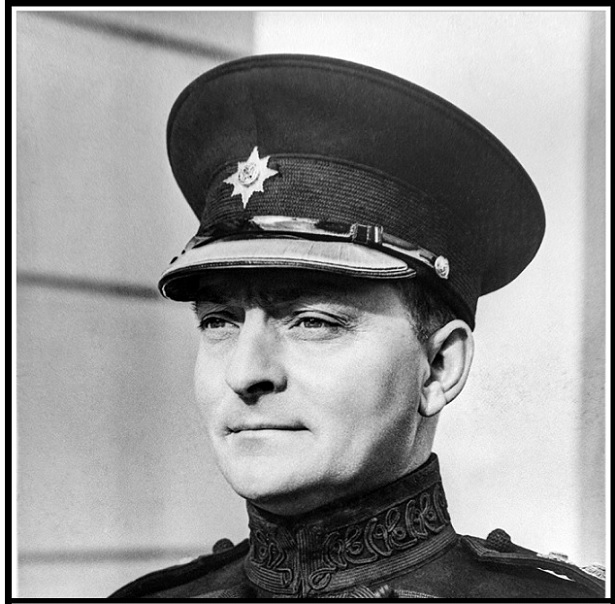
21: Lt Col Cecil H Jaeger OBE, Mus, Bac, LRAM, ARCM, psm (1913 – 1970)
For a conductor who made just eight appearances in less than three years on the contesting rostrum with Black Dyke Mills Band, Cecil H Jaeger certainly left an indelible mark.
It perhaps says a great deal about him as a musician, that although good fortune at the ‘major’ championships may not have been bestowed by the contesting Gods, the very mention of his name is remembered with both affection and respect.
Right man wrong time
In many ways, ‘Jiggs’ Jaeger was the right man at the wrong time at the Queensbury band.
From 1956, when Harry Mortimer ended his second period at the helm, to the end of the 1980s with the departure of Major Peter Parkes, Black Dyke enjoyed a triptych of appointments with the Guards Division of the British Army.
Links to the military were common during and after the Second World War, with many players returning to Black Dyke after serving their country. Principal cornet Willie Lang was a tank commander, whilst Jack Emmott (bandmaster from 1956 -1963) had been principal euphonium with the Band of the 5th Royal Inniskilling Dragoon Guards.
In many ways, ‘Jiggs’ Jaeger was the right man at the wrong time at the Queensbury band.
The most famous though was Major George Willcocks MBE, MVO, who took up the role as Professional Conductor in 1957. His appointment was to set a level of musical excellence that to this day retains almost mythical status.
His death, aged 62 in early 1964 left a musical chasm that could not be filled by either Leighton Lucas or George Hespe in the period that followed.
Miltary answer
With Jack Emmott having resigned and with the prospect of the band heading to the British Open under the inexperienced bandmaster Geoffrey Whitham, John Foster & Sons Ltd Director Peter Lambert sought a military answer to a band in need of an injection of much needed confidence.
Using his own connections (he had been a Captain in the Royal Inniskilling Fusiliers) with colleagues who now held senior military ranks, one name headed his list; Major Cecil Henry Jaeger.
Jaeger had followed Willcocks as Director of Music at the Irish Guards in 1949, and over the next thirteen years had gained a reputation as an inspirational conductor. Aged 51, Lambert hoped Black Dyke had finally found the ideal long-term successor.
Fortune though never rewarded the partnership perhaps as it deserved.
Diminuitive band boy
Born in Eltham in Kent 1913 to a German father and English mother, Jaeger’s early life was almost that of an orphan, although he learnt to play the cornet.
Aged 14, he enlisted as what he later called, “a very diminutive band boy” in the King's Own Yorkshire Light Infantry, showing a precocious musical talent and an ambitious determination to succeed. He said that he was placed in the regiment after revealing that his mother was from the county.
In 1937 he appeared as part of the trumpet fanfare team for the Coronation of George VI (“a musical highlight of my life”), before graduating from Kneller Hall with a reputation enhanced by several honours for composition and arranging and with an ability to quickly gain respect from players.
He soon attended Kneller Hall and within a decade of enlistment was accepted on its prestigious student bandmaster course.
In 1937 he appeared as part of the trumpet fanfare team for the Coronation of George VI (“a musical highlight of my life”), before graduating from Kneller Hall with a reputation enhanced by several honours for composition and arranging and with an ability to quickly gain respect from players.
Vienna Symphony Orchestra
Jaeger eventually secured an appointment as Bandmaster of the 4th Queen's Own Hussars in 1942 and remained with them, serving in Italy, Greece (where he had to take up a rifle) and Austria – the latter just after the end of the war where he was invited to conduct the Vienna Symphony Orchestra on six occasions.
His name was familiar to listeners on radio and on recordings, whilst he also made a fleeting appearance conducting a small military ensemble in a bandstand scene in the Michael Caine movie, ‘The Ipcress File’.
He was commissioned in 1948 at Sandhurst (where he said he enjoyed catching trout in its lake) and the following year was appointed Director of Music of the Irish Guards Band and promoted to Captain. In 1949 he received a BA degree in Music from Durham University.
He held the role for almost 20 years; his short stature, colourful conducting style and wit marking him as a favourite of audiences on numerous tours at home and abroad.
His name was familiar to listeners on radio and on recordings, whilst he also made a fleeting appearance conducting a small military ensemble in a bandstand scene in the Michael Caine movie, ‘The Ipcress File’.
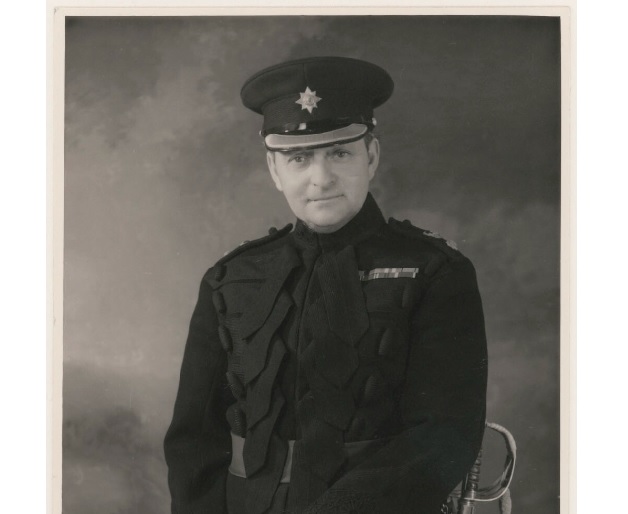
Strict but fair
Strict but fair
Not surprisingly, Black Dyke took to ‘Jiggs’ immediately.
Focussed with a military appreciation of aims and objectives, his rehearsals were quick and to the point. Even away from military protocol his authority was embedded without question.
The players found him “strict but fair”; able to defuse problems and to understand moods, strengths and weaknesses. It was said that he approached rehearsals much like a Catholic priest conducting a Mass - solemnly, decently and in order.
First test
The first test came at the 1964 North East Area contest at St. George’s Hall in Bradford.
'Jiggs’, dressed in a smart blue suit and red carnation in his buttonhole strode onto the stage to lead a thrilling Dyke performance of Vinter’s ‘Symphony of Marches’. They won by three points, the audience spellbound not only by his stylish conducting, but by the response it created from the band.
Famously, a picture of the late Major Willcocks hung on the wall directly behind the conductor in the Black Dyke bandroom. Soon after the victory Jaeger stated, “You must have one of me next to it.”
If Jaeger had a fault though, it was perhaps a sense of arrogance (although he was far from alone in this with military conductors at the time).
Famously, a picture of the late Major Willcocks hung on the wall directly behind the conductor in the Black Dyke bandroom. Soon after the victory Jaeger stated, “You must have one of me next to it.”
However, at the next rehearsal the photograph of Willcocks had been blown up three times in size: Jaeger was popular, but by no means as revered as his predecessor.
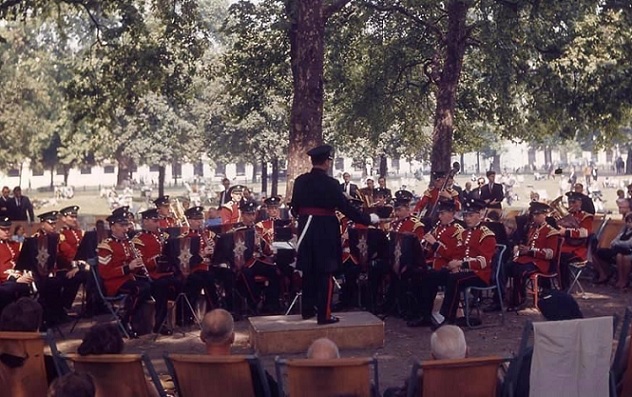
With the Irish Guards on bandstand duty in 1966
Open disaster
The 1964 British Open was a disaster; a muddled performance of bombast and brilliance on ‘Lorenzo’ ending thirteenth. Jaeger redeemed himself at the Nationals – inspiring a fine performance of ‘Variations on a Ninth’ that was only beaten by one of epic proportions by GUS (Footwear).
He was also the first serving Director of Music in the British Army to conduct at the National Finals.
The following year the band retained the Area title with an ornate account of ‘Themes’ from Beethoven’s ‘First Symphony’ – winning by four points. Deciding not to compete at the Open, the band’s focus returned to the Albert Hall.
Jaeger was confident, especially as the test-piece was ‘Triumphant Rhapsody’ by Gilbert Vinter – a composer whose works he enjoyed immensely. ‘Kelly’s Eye’ put pay to any hope of victory. They ended eighth.
Hat trick
Undeterred, the Area was won again in 1966 on ‘Le Roi d’Ys’; although it was remarked by some players that the performance wasn’t “a patch” on the legendary performance in winning the National under Major Willcocks.
It did however see Jaeger gain a place on the famous ‘hat-trick’ wall in the bandroom.
As much as they enjoyed his musical approach, this was an era when contesting success meant more than artistic plaudits. With patience starting to waver, a telling sign came in the lead up to the 1966 National Finals where they were to play ‘Le Carnival Romain’.
And so Black Dyke headed back to the British Open only to find another early draw scuppering their chances. They eventually finished fifth on ‘A Downland Suite’.
As much as they enjoyed his musical approach, this was an era when contesting success meant more than artistic plaudits. With patience starting to waver, a telling sign came in the lead up to the 1966 National Finals where they were to play ‘Le Carnival Romain’.
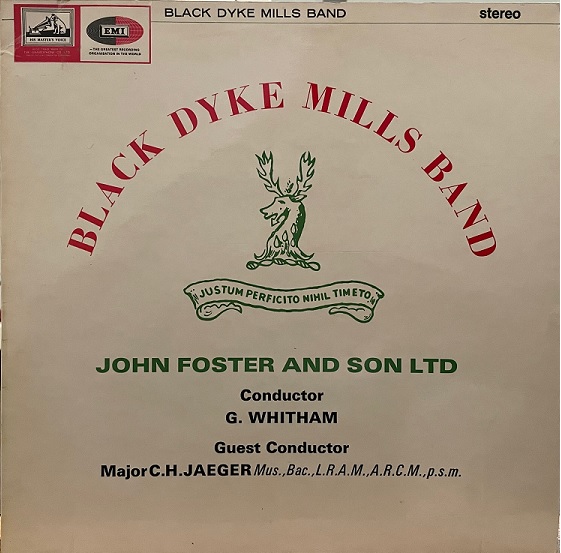
Colonel Bogey
It was later recalled by Frank Dean in his booklet, ‘The Magic of Black Dyke’.
One evening Jaeger arrived punctilious and focussed as ever, unaware that the band had been notified of his recent military promotion. He had wanted to tell them later that evening, yet as he brought down the baton to open the Berlioz work they launched into a rendition of ‘Colonel Bogey’.
“You…..”, he said as things descended into laughter.
Behind the smiles though, perhaps they all knew it was the beginning of the end. The message had a duality about it.
That said, Jaeger did everything in his considerable musical powers to leave on a high.
As the late David Horsfield recalled in his autobiography. “Dyke played a blinder”, he wrote, “and my vivid memories are of the entrance on the RAH stage by Major Jaeger, looking resplendent with his Yorkshire white rose”.
As the late David Horsfield recalled in his autobiography, “Dyke played a blinder - and my vivid memories are of the entrance on the RAH stage by Major Jaeger, looking resplendent with his Yorkshire white rose”.
The following ten minutes captivated the audience and as David recalled, “particularly John Clough’s euphonium playing of the cor-anglaise solo in fine style. ‘Jiggs’ imitating a violinist as John cruised through the high solo beautifully.”
It wasn’t to be. Once again GUS (Footwear) produced a stunning performance to beat them.
As principal cornet Jim Shepherd later recalled: “Jiggs big ambition was to win the National, but he just couldn’t do it. What was it? Two seconds and an eighth, I think, when we drew number one. Tragic, but nothing much he could have done about it. Just couldn’t crack London.”
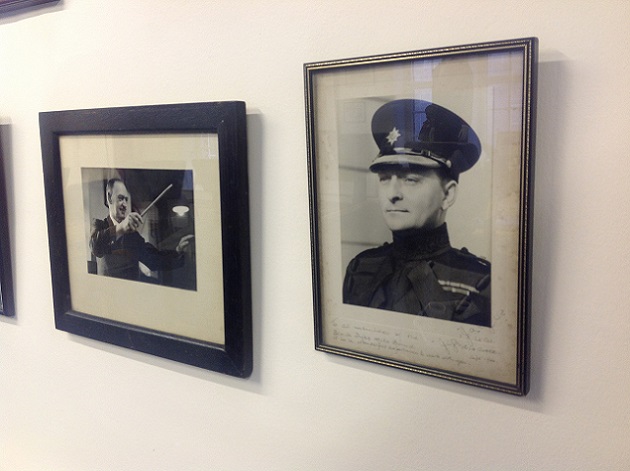
Forever on the famous hat-trick wall
The end
Jaeger’s appointment as a Senior Director of Music of the Brigade of Guards was demanding enough (including tours to the USA, Canada and South America), with responsibility for the music at the major events such as Trooping the Colour and the funeral of Winston Churchill meaning that successfully continuing with Black Dyke was almost impossible.
His departure though came in some style.
The dry wit never left him. The departure was on his own terms.
After a rather anxious moment in a concert in Wigan late in 1966, Lt Col Jaeger came into the dressing room where he sat by the piano and played a few bars of ‘Colonel Bogey’ with the words “Good evening, gentlemen” and left.
The dry wit never left him. The departure was on his own terms.
In September 1968 he also retired from his Irish Guards role following a month long tour to Canada, and became Chief Instructor of Music at Kneller Hall (awarded the OBE), a post he held until his death.
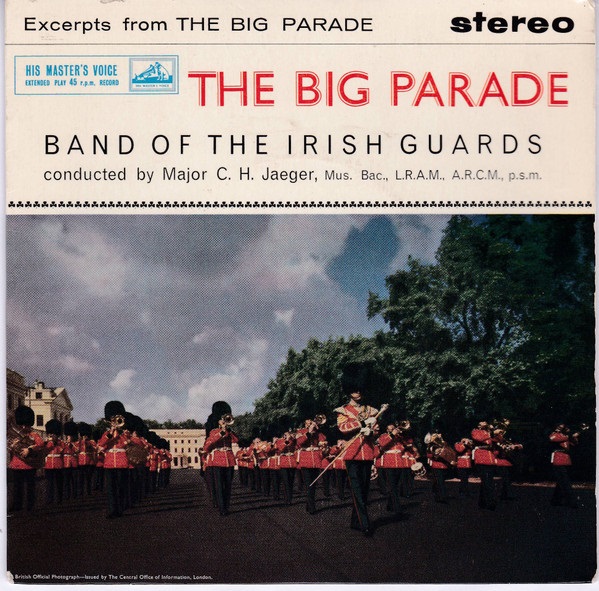
Desert Island discs
He also became the only former conductor of Black Dyke Mills Band to be invited as a castaway on the famous BBC Radio programme ‘Desert Island Discs’ in November that year.
However, the interview (he spoke with a voice rather like Sir Alf Ramsay) included no mention of any brass band connection or any brass band track in his eight records to take with him, despite his assertion that the music chosen had to, “remind one of my musical career apart from anything else.”
However, the interview (he spoke with a voice rather like Sir Alf Ramsay) included no mention of any brass band connection or any brass band track in his eight records to take with him, despite his assertion that the music chosen had to, “remind one of my musical career apart from anything else.”
Instead, he picked works by Mendelssohn, Bach, Parry, Brahms, Elgar, Prokofiev, a military band arrangement in march style of ‘Michelle’ by ‘The Beatles’ and his own composition, ‘Jigger’s Corn’, which was commissioned to accompany cinema goers leaving the auditorium after a film.
The title he said came as they “wanted some corny music” – complete with swanee whistle.
His book was an ‘Anthology of Modern British Poetry’ and his luxury, a chess set.
He was to adjudicate at the inaugural World Championships at the Royal Albert Hall in October 1970, but died in Richmond on Thames on 27th September. He was 57.
Tim Mutum
4BR Hall of Fame: No.1: Jack Atherton
https://www.4barsrest.com/articles/2019/1832.asp
4BR Hall of Fame: No.2: Albert Baile
https://www.4barsrest.com/articles/2019/1836.asp
4BR Hall of Fame: No.3: Stanley Boddington
https://www.4barsrest.com/articles/2019/1842.asp
4BR Hall of Fame: No.4: Bram Gay
https://www.4barsrest.com/articles/2020/1848.asp
4BR Hall of Fame: No.5: Leonard Lamb
https://www.4barsrest.com/articles/2020/1855.asp
4BR Hall of Fame: No.6: Arthur Stender
https://www.4barsrest.com/articles/2020/1866.asp
4BR Hall of Fame: No.7: Violet Brand
https://www.4barsrest.com/articles/2020/1871.asp
4BR Hall of Fame: No.8: Eric Bravington
https://www.4barsrest.com/articles/2020/1875.asp
4BR Hall of Fame: No.9: Norman Ashcroft
https://www.4barsrest.com/articles/2020/1879.asp
4BR Hall of Fame: No.10: Albert Chappell
https://www.4barsrest.com/articles/2020/1884.asp
4BR Hall of Fame: No.11: Betty Anderson
https://www.4barsrest.com/articles/2020/1889.asp
4BR Hall of Fame: No.12: Trevor Walmsley DFC
https://www.4barsrest.com/articles/2020/1897.asp
4BR Hall of Fame: No.13: Percy Code
https://www.4barsrest.com/articles/2020/1903.asp
4BR Hall of Fame: No.14: George Thompson MBE
https://www.4barsrest.com/articles/2020/1909.asp
4BR Hall of Fame: No.15: Willie Lang
https://www.4barsrest.com/articles/2020/1914.asp
4BR Hall of Fame: No.16: James Scott
https://www.4barsrest.com/articles/2021/1916.asp
4BR Hall of Fame: No.17: Jack Mackintosh
https://www.4barsrest.com/articles/2021/1922.asp
4BR Hall of Fame: No.18: Teddy Gray
https://www.4barsrest.com/articles/2021/1928.asp
4BR Hall of Fame: No.19: Rowland Jones
https://www.4barsrest.com/articles/2021/1932.asp
4BR Hall of Fame: No.20: Helen Perkin
https://www.4barsrest.com/articles/2021/1944.asp













